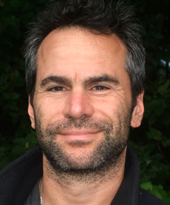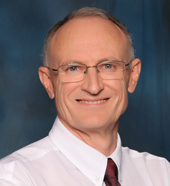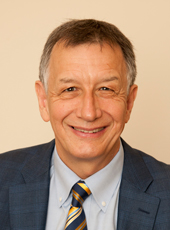APS College of Counselling Psychologists
Keynote speakers
Grief and grief counseling today: Controversy, evidence, and implications for clinical practice
Professor Dale Larson
Santa Clara University, United States of America
Dale G. Larson, Ph.D., is a Professor of Counselling Psychology at Santa Clara University, where he directs graduate studies in health psychology. A national leader in end-of-life care and training, he is a Fulbright Scholar, a Fellow in the American Psychological Association, and was Senior Editor and a contributing author for Finding Our Way: Living with Dying in America, the Robert Wood Johnson funded national newspaper series that reached 7 million Americans. He is the author of the award-winning book, The Helper's Journey: Working With People Facing Grief, Loss, and Life-Threatening Illness, and his scholarly publications on grief and loss, grief counselling, stress and stress management in health professionals, self-concealment and secrets, and transdisciplinary team development are widely cited, both in the scientific literature and in the popular media. His clinical practice focuses on assisting individuals and families confronting grief and life-limiting illness. A frequent keynote speaker at state, national, and international conferences, Dale Larson is committed to maximizing the contribution of psychology to human welfare by giving the principles and skills of psychology away to the public and to professional and volunteer helpers.
Abstract
There is mounting debate with the bereavement field on several key issues, including determing which are the most accurate and clinically useful models of the grieving process, reconciling the grief work hypothesis with contemporary empirical findings, deciding whether a diagnosis of prolonged grief disorder should be included in DSM-5, and establishing whether grief counselling is helpful, inefficacious, or possibily even harmful. Controversy concerning these issues is also swirling in the public realm, with harsh critiques of grief counselling and the bereavement field itself making headlines in the popular media. Recent empirical findings and conceptual developments offering new perspectives on these controversies will be presented, along with their implications for clinical practice.
 Psychotherapy research findings: What the evidence is telling us
Psychotherapy research findings: What the evidence is telling us
Professor Mick Cooper
University of Strathclyde, Scotland
Mick Cooper DPhil CPsychol is a Professor of Counselling at the University of Strathclyde, Glasgow, Scotland; and has led research and developments in the fields of person-centred, humanistic, and existential approaches to counselling and psychotherapy. He is a Chartered Counselling Psychologist and co-Director of the Doctorate in Counselling Psychology at the University of Strathclyde/Glasgow Caledonian University. Mick is the author of several leading texts in the field, including Existential Therapies (Sage, 2003), Working at relational depth in counselling and psychotherapy (Sage, 2005, co-authored with Dave Mearns), Essential Research Findings in Counselling and Psychotherapy (Sage, 2008) and Pluralistic Counselling and Psychotherapy (Sage, 2005, co-authored with John McLeod). Mick is also recognised for his research into humanistic school-based counselling.
Abstract
How effective are humanistic therapies compared against CBT? Does supervision lead to better client outcomes? How can therapists boost the effectiveness of their practice? This lecture will present a practitioner-friendly summary of research findings in the psychotherapy and counseling research field, addressing these questions and many more. It will look at the overall outcomes of psychotherapy; and the role of therapist, client, relational and technique factors in producing positive outcomes. The talk will discuss the concrete, practical implications of these findings for counseling psychologists, and how it can help them to develop their work.
 The Neuroscience of Talking Therapies: Implications for Therapeutic Practice
The Neuroscience of Talking Therapies: Implications for Therapeutic Practice
Dr Pieter Rossouw
University of Queensland, Australia.
Pieter is the Director the Unit for Neuropsychotherapy and Master of Counselling Program at the School of Psychology and the School of Social Work and Human Services at The University of Queensland. His research and teaching focuses on Neuropsychotherapy. Pieter is also the Director of Mediros – a company that provides training in Neurobiology and Neuropsychotherapy.
Pieter has been in private practice for the past 25 years. Pieter holds Honours Degrees in Philosophy and Psychology, a Master Degree in Clinical Psychology and a PhD. Pieter is a member of the Australian Psychological Society and the APS College of Clinical Psychologists. He provides Mental Health training for GP’s and is accredited at the Royal Australian College of General Practitioners. Pieter was a Professor in Clinical Psychology at Universities in Canada, Holland and South Africa where he also spearheaded a Psycho-Therapeutic Assistance Program to support people being exposed to trauma.
Pieter specialises in Neuropsychotherapy and is an expert in anxiety and mood disorders. He has published 5 Scientific Books and 20 scientific articles. He has been involved in research in extensive clinical trials and presented research papers at 30 International Conferences worldwide. He is a member of the Global Association for Interpersonal Neurobiology Studies, the International Society for Traumatic Stress Studies, the International Association for Family Therapy and the Professional Association for Drug and Alcohol Workers, the Australasian Cognitive Neuroscience Society and the Board of the Neuropsychotherapist with fellow researchers Allan Shore, Louis Cozolino, Todd Feinberg and Georg Northoff.
Abstract
The effect of counselling has been a central focus for scientific study and discourse for many years. Recently, neurobiological research provided a unique insight into the effect of enriched environments (among them – structured talking – counselling/therapy) in affecting the brain.
Since Nobel laureate, Eric Kandel proposed a New Intellectual Framework for Therapy in 1995, neurobiological research demonstrated the effect of talking therapies not only on behavioural change, thinking patterns or feelings but on neurochemical shifts, neural activity and even neuro-structural changes.
This keynote explores recent findings in neuroscience and how these findings shape the future of talking therapies. Neurobiological findings opened new perspectives regarding:
- The impact of the person of the therapist in the counselling process:
The role of down regulation of early developed (pre and post natal) fear systems in the brain are key to effective therapeutic interventions. - The role of mirror neurons on the effects size of counselling:
Findings regarding the role of mirror neurons opened new perspectives into understanding what shape human behaviour. - The nature/nurture debate:
The shift from the focus on genetic predispositions to genetic expression changed the landscape of understanding and addressing the human condition. - The question whether the brain is essentially driven by chemical or electrical processes.
- How memory operates.
These perspectives have profound implications for talking therapies. Implications of these findings will be explored and how Counselling has become a central catalyst for change.




